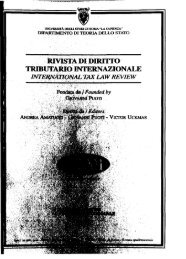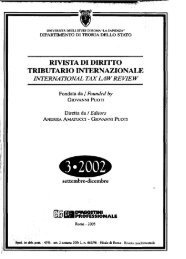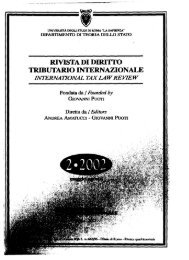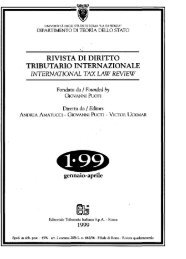RIVISTA DI DIRITTO TRIBUTARIO INTERNAZIONALE - Rdti.it
RIVISTA DI DIRITTO TRIBUTARIO INTERNAZIONALE - Rdti.it
RIVISTA DI DIRITTO TRIBUTARIO INTERNAZIONALE - Rdti.it
Create successful ePaper yourself
Turn your PDF publications into a flip-book with our unique Google optimized e-Paper software.
Sez.ione l - Dottrina<br />
of article 48 of the Consolidated Law shall be applicable solely in those<br />
cases in which <strong>it</strong> is possible to identify the workplace or the company's<br />
office, having made provision for the possibil<strong>it</strong>y, if the opposi te were to<br />
happen, to consider the tax domicile of the collaborator.<br />
Equally, the qualification of co-ordinated and continuous collaboration<br />
contracts as subordinated employment contracts implies the extension<br />
to the same of other rules which are provided for in the subordinated<br />
employment legislation: by virtue of article 48 bis, in fact, ali the<br />
legislation on fringe benef<strong>it</strong>s and stock options are applicable to co-ordinated<br />
and continuous collaborators (49).<br />
Il has been pointed out how the changed qualification of co-ordinated<br />
and continuous collaboration contracts in particular, has been the resul!<br />
"of the assimilation of the tax concept of co-ordinated and continuous<br />
collaboration contracts to the employment law concept of so-called<br />
non-subordinated employment contracts" (50).<br />
Undoubtedly the changed qualification of co-ordinated and continuous<br />
collaboration contracts represents the logical consequence, from an<br />
employment law point of view, of the extension to the latter of concepts<br />
which were originally conceived for subordinated employment contracts.<br />
Since, however, <strong>it</strong> has not been possible to match non-subordinated<br />
and subordinated employment contracts from an employment law point<br />
of view, ali the more so such matching has been impossible in the field<br />
of taxation law, where a substantive defin<strong>it</strong>ion of co-ordinated and continuous<br />
collaboration contracts highlights the differences between the<br />
two categories.<br />
We are therefore more inclined to hold that the assimilation of co-ordinated<br />
and continuous collaboration contracts to subordinated employment<br />
contracts is the result of what has already been achieved in tax legislation<br />
whilst Presidential Decree no. 59711973 \Vas in Force and, that is<br />
to say, the substantial affirmation of a third type of work contract, which<br />
is nearer to subordinated employment contracts, even in the absence of<br />
paragraph 4 of the Association between Italian Cap<strong>it</strong>ai Companies; as regards the legai<br />
scholars cfr. F. Romagnoli, Ne" .. ' provisions on co-ordinated and continuous collaboration<br />
contracts. Operational problerns ,,\'<strong>it</strong>h particular regard to expenses reirnbursernent,<br />
Il fisco, n.3/2001, 609.<br />
(49) Cfr, lastly, circular no. 67/E dated 6.7.2001, in Il fisco n. 28/2001, paragraph<br />
3, 9587.<br />
(50) See on this point circular no. 6 dated 25.1.2001 paragraph 1 of the Association<br />
between ltalian Lim<strong>it</strong>ed Liabil<strong>it</strong>y Companies.<br />
<strong>RIVISTA</strong> <strong>DI</strong> DlRITIO TRJBLTARIO I\TERNAZIO\ALE 312001






